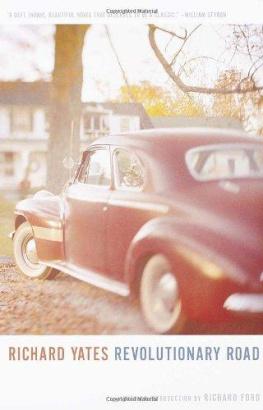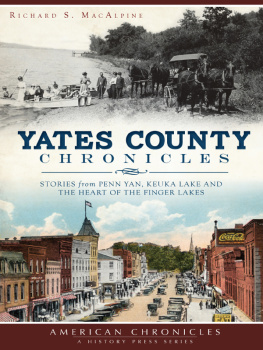REVOLUTIONARY ROAD
Richard Yates
VINTAGE CONTEMPORARIES
Vintage Books
A Division of Random House, Inc.
New York
THIRD VINTAGE CONTEMPORARIES EDITION, MAY 2008
Copyright 1961, copyright renewed 1989 by Richard Yates
All rights reserved. Published in the United States by
Vintage Books, a division of Random House, Inc.,
New York, and in Canada by Random House of
Canada Limited, Toronto. Originally published in hardcover
in the United States by Little, Brown & Co., Boston,
Massachusetts, in 1961.
Vintage and colophon are registered trademarks and Vintage Contemporaries is a trademark of Random House, Inc.
Library of Congress Cataloging-in-Publication Data
Yates, Richard, 19261992.
Revolutionary road / Richard Yates.
Vintage Contemporaries ed.
p. cm.
eISBN: 978-0-307-45627-4
1. Married peopleConnecticutFiction. 2. Suburban life
ConnecticutFiction. I. Title.
PS3575.A83 R4 2000
813'54dc21 99-055503
Author photograph 1989 by Jill Krementz Book design by Christopher M. Zucker
www.vintagebooks.com
v1.0
To Sheila
Alas! when passion is both meek and wild! john keats
ONE
THE FINAL DYING SOUNDS of their dress rehearsal left the Laurel Players with nothing to do but stand there, silent and helpless, blinking out over the footlights of an empty auditorium. They hardly dared to breathe as the short, solemn figure of their director emerged from the naked seats to join them on stage, as he pulled a stepladder raspingly from the wings and climbed halfway up its rungs to turn and tell them, with several clearings of his throat, that they were a damned talented group of people and a wonderful group of people to work with.
"It hasn't been an easy job," he said, his glasses glinting soberly around the stage. "We've had a lot of problems here, and quite frankly I'd more or less resigned myself not to expect too much. Well, listen. Maybe this sounds corny, but something happened up here tonight. Sitting out there tonight I suddenly knew, deep down, that you were all putting your hearts into your work for the first time." He let the fingers of one hand splay out across the pocket of his shirt to show what a simple, physical thing the heart was; then he made the same hand into a fist, which he shook slowly and wordlessly in a long dramatic pause, closing one eye and allowing his moist lower lip to curl out in a grimace of triumph and pride. "Do that again tomorrow night," he said, "and we'll have one hell of a show."
They could have wept with relief. Instead, trembling, they cheered and laughed and shook hands and kissed one another, and somebody went out for a case of beer and they all sang songs around the auditorium piano until the time came to agree, unanimously, that they'd better knock it off and get a good night's sleep.
"See you tomorrow!" they called, as happy as children, and riding home under the moon they found they could roll down the windows of their cars and let the air in, with its health-giving smells of loam and young flowers. It was the first time many of the Laurel Players had allowed themselves to acknowledge the coming of spring.
The year was 1955 and the place was a part of western Connecticut where three swollen villages had lately been merged by a wide and clamorous highway called Route Twelve. The Laurel Players were an amateur company, but a costly and very serious one, carefully recruited from among the younger adults of all three towns, and this was to be their maiden production. All winter, gathering in one another's living rooms for excited talks about Ibsen and Shaw and O'Neill, and then for the show of hands in which a common-sense majority chose The Petrified Forest, and then for preliminary casting, they had felt their dedication growing stronger every week. They might privately consider their director a funny little man (and he was, in a way: he seemed incapable of any but a very earnest manner of speaking, and would often conclude his remarks with a little shake of the head that caused his cheeks to wobble) but they liked and respected him, and they fully believed in most of the things he said. "Any play deserves the best that any actor has to give," he'd told them once, and another time: "Remember this. We're not just putting on a play here. We're establishing a community theater, and that's a pretty important thing to be doing."
The trouble was that from the very beginning they had been afraid they would end by making fools of themselves, and they had compounded that fear by being afraid to admit it. At first their rehearsals had been held on Saturdaysalways, it seemed, on the kind of windless February or March afternoon when the sky is white, the trees are black, and the brown fields and hummocks of the earth lie naked and tender between curds of shriveled snow. The Players, coming out of their various kitchen doors and hesitating for a minute to button their coats or pull on their gloves, would see a landscape in which only a few very old, weathered houses seemed to belong; it made their own homes look as weightless and impermanent, as foolishly misplaced as a great many bright new toys that had been left outdoors overnight and rained on. Their automobiles didn't look right eitherunnecessarily wide and gleaming in the colors of candy and ice cream, seeming to wince at each splatter of mud, they crawled apologetically down the broken roads that led from all directions to the deep, level slab of Route Twelve. Once there the cars seemed able to relax in an environment all their own, a long bright valley of colored plastic and plate glass and stainless steelking kone, mobilgas, shoporama, eatbut eventually they had to turn off, one by one, and make their way up the winding country road that led to the central high school; they had to pull up and stop in the quiet parking lot outside the highschool auditorium.
"Hi!" the Players would shyly call to one another.
"Hi!..." "Hi!..." And they'd go reluctantly inside.
Clumping their heavy galoshes around the stage, blotting at their noses with Kleenex and frowning at the unsteady print of their scripts, they would disarm each other at last with peals of forgiving laughter, and they would agree, over and over, that there was plenty of time to smooth the thing out. But there wasn't plenty of time, and they all knew it, and a doubling and redoubling of their rehearsal schedule seemed only to make matters worse. Long after the time had come for what the director called "really getting this thing off the ground; really making it happen," it remained a static, shapeless, inhumanly heavy weight; time and again they read the promise of failure in each other's eyes, in the apologetic nods and smiles of their parting and the spastic haste with which they broke for their cars and drove home to whatever older, less explicit promises of failure might lie in wait for them there.
And now tonight, with twenty-four hours to go, they had somehow managed to bring it off. Giddy in the unfamiliar feel of make-up and costumes on this first warm evening of the year, they had forgotten to be afraid: they had let the movement of the play come and carry them and break like a wave; and maybe it sounded corny (and what if it did?) but they had all put their hearts into their work. Could anyone ever ask for more than that? The audience, arriving in a long clean serpent of cars the following night, were very serious too. Like the Players, they were mostly on the young side of middle age, and they were attractively dressed in what the New York clothing stores describe as Country Casuals. Anyone could see they were a better than average crowd, in terms of education and employment and good health, and it was clear too that they considered this a significant evening. They all knew, of course, and said so again and again as they filed inside and took their seats, that The Petrified Forest was hardly one of the world's great plays. But it was, after all, a fine theater piece with a basic point of view that was every bit as valid today as in the thirties ("Even more valid," one man kept telling his wife, who chewed her lips and nodded, seeing what he meant; "even more valid, when you think about it"). The main thing, though, was not the play itself but the companythe brave idea of it, the healthy, hopeful sound of it: the birth of a really good community theater right here, among themselves. This was what had drawn them, enough of them to fill more than half the auditorium, and it was what held them hushed and tense in readiness for pleasure as the house lights dimmed.












